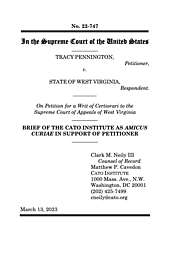She challenged the constitutionality of the search. At the hearing on her motion to suppress, the deputy admitted to not knowing where the girl was when he went to the apartment. The only reason he gave for not getting a search warrant was that a prosecutor said he didn’t need one. The trial court denied Ms. Pennington’s motion, finding that the entry into the apartment was not unreasonable. Ms. Pennington entered a conditional guilty plea to one count of child concealment, then appealed. The West Virginia Supreme Court of Appeals affirmed, holding that officers do not need probable cause that the subject of an arrest warrant (like the pickup order) resides in a home and is present before entering.
Cato filed an amicus brief asking the Supreme Court to review the decision, arguing that dispensing with the need for probable cause violates the Fourth Amendment. The Constitution protects Americans from unreasonable searches, and its probable cause requirement secures homes against needless entries.
Probable cause protects more than just property and privacy—limiting unnecessary home intrusions saves lives. As Justice Robert Jackson noted in an opinion for the Supreme Court, many homeowners panic when an unknown person starts to enter their homes, and they can even react violently without realizing that they’re attacking law enforcement officers. Officers faced with this may well fight back. Needless home entries pose perils for residents and officers alike.
Police entries into homes are sometimes necessary. But developing probable cause that the subjects of warrants are actually inside reduces the risk of harm and honors the Fourth Amendment.


